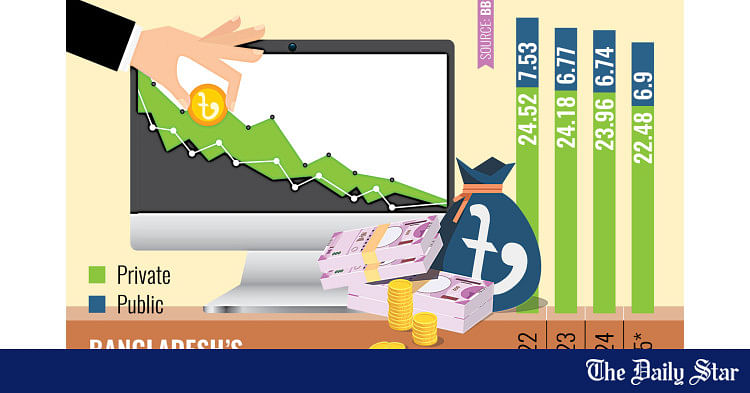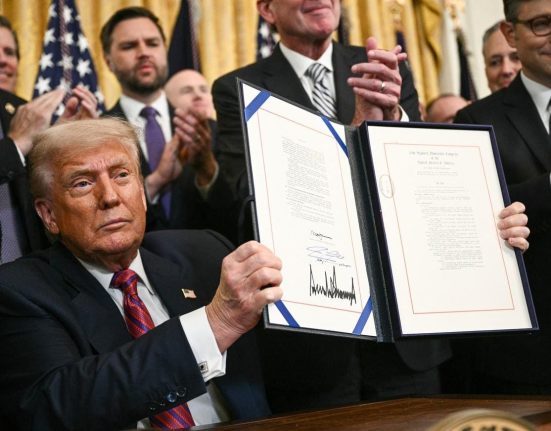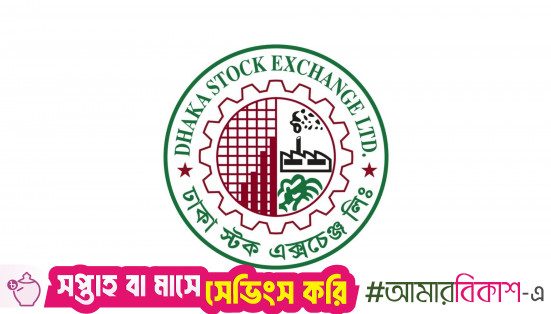Private investment as a percentage of the gross domestic product has slumped to its lowest level in five years, stoking fears over waning business confidence and a slowdown in job creation.
Private investment dropped to 22.48 percent of the gross domestic product (GDP) in the fiscal year (FY) 2024–25 from 23.96 percent the year before, according to provisional data released by the Bangladesh Bureau of Statistics (BBS) on Tuesday.
The current ratio is the weakest since the fiscal year 2020–21.
“This isn’t just a drop in numbers, it shows growing mistrust in the investment climate,” said Anwar-ul-Alam Chowdhury Parvez, president of the Bangladesh Chamber of Industries.
He pointed to deteriorating business conditions, such as inconsistent gas supply despite price hikes, a rising dollar choking imports, and banks plagued by a liquidity crunch.
Lending rates have surged to 16–17 percent, sharply pushing up the cost of doing business.
Parvez said political instability was further undermining confidence, shaking trust in state institutions and the government’s ability to restore order.
“These problems are not hitting just individual businesses, they’re hurting the whole economy,” he said.
Citing persistent issues in the energy sector, law enforcement, and customs, the business leader called for stability to reassure investors.
Under the 8th Five Year Plan, the former Awami League-led government aimed to raise private investment to 28.2 percent of GDP by 2025.
That goal now appears increasingly out of reach. The latest BBS data aligns with weak credit growth in the private sector.
In March, year-on-year credit growth stood at just 7.57 percent, well below the Bangladesh Bank’s target for the first half of the year.
Imports of capital machinery, measured by the opening of letters of credit, fell by 26 percent year-on-year to $1.8 billion in the first nine months of the current fiscal year, central bank data show.
“The BBS data show a sharp decline in private investment. This is a worrying sign for both employment and overall economic growth,” said Mustafizur Rahman, distinguished fellow at local think tank Centre for Policy Dialogue (CPD).
The economist linked the downturn to falling imports of capital machinery, suggesting fewer new industrial ventures and limited contributions from the private sector to GDP growth and job creation.
Private sector credit growth, Rahman added, continues to fall short of the government’s 9 percent target, hovering below 7 percent.
Export-oriented and import-substituting industries, which are usually the engines of private investment, are largely sticking to their existing capacity rather than expanding, said Rahman.
This stagnation, he said, is holding back economic momentum.
He cited several causes, such as political uncertainty, rising borrowing costs, and sluggish structural reforms, especially in logistics and trade facilitation.
“Private sector investment growth has essentially stalled,” he said, urging swift political stabilisation, greater access to finance, and a stronger push for policy reforms to revive investor confidence.
M Masrur Reaz, chairman and CEO of the Policy Exchange of Bangladesh, described the fall in investment as a plain warning. “This isn’t just a statistical decline, it reflects growing uncertainty about the country’s political and economic direction.”
According to Reaz, a combination of weak investor sentiment, political unrest, and slow reform is threatening critical development goals, including technological upgrades, greater industrial competitiveness, and economic diversification.
“Private investment drives employment and output. Without it, sustainable growth will remain out of reach,” he said.
Reaz also pointed to widespread disruption — protests, administrative delays, and operational bottlenecks — that have stalled both decision-making and supply chains.
“The uncertainty around the transition to an elected government is fuelling investor anxiety,” he said. “Clarity on political direction is essential. Long-term investors are waiting. Without that, investment will not rebound.”
Selim Raihan, executive director of the South Asian Network on Economic Modeling (Sanem), said the declining investment trend reflects deep-rooted macroeconomic and political weaknesses.
He cited soaring inflation, high interest rates, foreign exchange instability, and political turmoil as key factors eroding investor confidence.
Raihan added that the absence of consensus on reforms, coupled with uncertainty over the election timeline, has heightened perceptions of risk. With an interim government in place, many investors are reluctant to commit, unsure whether policies will remain consistent.
“This unpredictability makes long-term investment decisions difficult,” he said.
Raihan said that the slump in private investment could deal a heavy blow to the country’s industrialisation drive, youth employment prospects, and efforts to diversify its economy ahead of its graduation from least developed country (LDC) status.
He also said foreign direct investment (FDI) may dry up, as global investors often take local sentiment into account before committing funds.
“Without clear signals of stability and reform, FDI inflows may stagnate, further constraining the country’s development ambitions,” he said.
Asif Ibrahim, former president of the Dhaka Chamber of Commerce & Industry (DCCI), has expressed concern over the declining investment-to-GDP ratio and the slowdown in private sector credit growth, warning that these trends could have serious implications for employment.
“With around 20 lakh young people entering the job market every year, the private sector plays a crucial role in absorbing this growing workforce,” said Ibrahim.
A continued decline in investment, he said, may result in rising unemployment.







